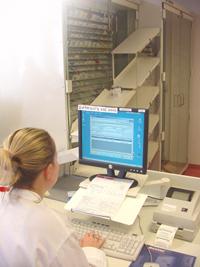|
|
Online pharmacies and your medicine

Buying medicine onlineThe Internet has changed the way we live, work and shop. The growth of the Internet has made it possible to compare prices and buy products without ever leaving home. But when it comes to buying medicine online, it is important to be very careful. Some websites sell medicine that may not be safe to use and could put your health at risk. You have to talk with your doctor and have a physical exam before you get any new medicine for the first time. Use only medicine that has been prescribed by your doctor or another trusted professional. Be sure your privacy is protected: look for privacy and security policies that are easy-to-find and easy-to-understand. Don't give any personal information such as social security number, credit card, or medical or health history, unless you are sure the website will keep your information safe and private. Buying your medicine online can be easy. Just make sure you do it safely. Drug interactions: what you should knowThere are more opportunities today than ever before to learn about your health and to take better care of yourself. It is also more important than ever to know about the medicines you take. Drug interactions may make your drug less effective, cause unexpected side effects, or increase the action of a particular drug. Some drug interactions can even be harmful to you. Reading the label every time you use a nonprescription or prescription drug and taking the time to learn about drug interactions may be critical to your health. You can reduce the risk of potentially harmful drug interactions and side effects with a little bit of knowledge and common sense. Mixing two drugs together could make one of the drugs ineffective. The combination also could increase a drug's effect, and be harmful. The result might be mild symptoms such as nausea, stomach upset, or headache, or more serious symptoms such as a dramatic drop in blood pressure, irregular heart beat, or damage to the liver-the primary way that drugs pass through the human body. When a drug is taken orally, it usually travels from the stomach to the liver, where it can be metabolized-the process of breaking down and removing chemicals from the body. Enzymes are complex proteins that act as catalysts in starting or speeding up chemical reactions. They cause a specific chemical change in other substances without being changed themselves. Not everything that happens in a test tube will become meaningful in humans, though. Results from these test-tube studies can tell us whether need to do further testing in people to find out if an interaction is clinically significant. In addition to having a good grasp of drugs and their effects, doctors take medication histories, and they consult with other members of their team to guide them in making decisions about drug interactions. They also use concise drug summaries and resources on pharmacological principles. Drug interactions with dietary supplements includes herbs and vitamins, which can interact with drug-metabolizing enzymes. St. John's wort is an herb commonly used by people with cancer to improve mood, but research has shown it interferes with the metabolism of irinotecan, a standard chemotherapy treatment. Vitamin K (in dietary supplements or food) produces blood-clotting substances that may reduce the effectiveness of blood-thinning medicines like warfarin. It is possible to lower the risks of medicinesAlthough medicines can make you feel better and help you get well, it's important to know that all medicines, both prescription and over-the-counter, have risks as well as benefits. The benefit and risk decision is sometimes difficult to make. The best choice depends on your particular situation. You must decide what risks you can and will accept in order to get the benefits you want. For example, if facing a life-threatening illness, you might choose to accept more risk in the hope of getting the benefits of a cure or living a longer life. On the other hand, if you are facing a minor illness, you might decide that you want to take very little risk. In many situations, the expert advice of your doctor, pharmacist, or other health care professionals can help you make the decision. To lower the risks and obtain the full benefits of medicines you need a)talk with your doctor, pharmacist, or other health care professionals; b)know your medicines--prescription and over-the-counter; c)read the label and follow directions; d)avoid interactions; e)monitor your medicines' effects--and the effects of other products that you use You have to always tell your doctor if you are or might become pregnant, or if you are nursing a baby. Always ask questions about any concerns or thoughts that you may have. Read and follow the directions on the label and the directions from your doctor, pharmacist, or other health care professional. If you stop the medicine or want to use the medicine differently than directed, consult with your health care professional. Before starting any new medicine or dietary supplement (including vitamins or herbal supplements), ask your doctor again if there are possible interactions with what you are currently using. You always have to pay attention to how you are feeling; note any changes. Write down the changes so that you can remember to tell your doctor, pharmacist, or other health care professional.
Why not go to the site about Love now?
|
|
